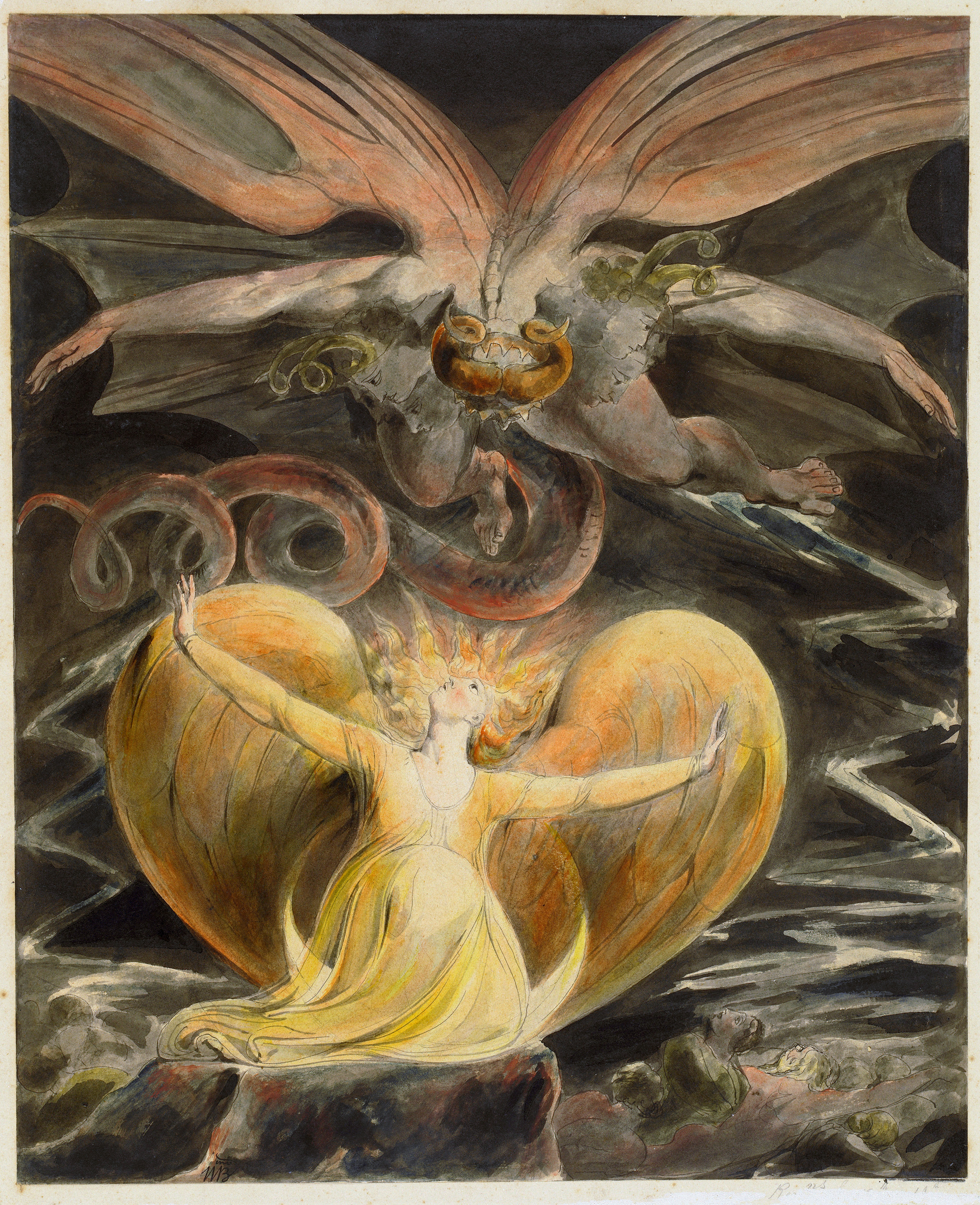 |
| William Blake, The Great Red Dragon and the Woman Clothed with the Sun, 1805 |
Grendel can be characterized as a product of William Blake's works concerning the influences of innocence and experience.
When he speaks of his childhood, Grendel reminisces of a period free from intrusion of religion, free from the violence that he soon comes to know. He participates in games with "ingenious twists into freedom or new perplexity" (Gardner 15), revealing his preparedness for exploring the world around him. In my mind, I imagine a young Toothless from Pixar's How to Train Your Dragon prancing around a forest, observing various plants and creatures as if they were all new to him.
However, Grendel mentions that occasionally "the spell would be broken suddenly" (Garnder 16), and he starts noticing large shapes with eyes watching him. Though it's unclear what these masses may be, they make him "feel, all at once, alone and ugly, almost... obscene" (Gardner 17). A shape could be defined, as Blake writes in "Infant Sorrow," "like a fiend hid in a cloud" ("Infant Sorrow," line 4). Although they remain ambiguous in features, the shapes seem to be "hiding" behind Grendel's innocence, waiting for experience to shape Grendel; this could also be seen when Grendel sees the shapes and doesn't understand what they mean, showing that he doesn't yet have knowledge of certain things.
As Grendel is taught by the Shaper, his mentor could act like the guardian mentioned in Blake's "Introduction" to Songs of Innocence. The Shaper within Grendel fulfills the role of maintaining the naivety and innocence of the Danes; he performs songs that speak to them of "truths" that may be warped in order to protect his people. His character could be related to the piper in the Song of Innocence. The piper within the "Introduction" performs and sings songs of "merry chear" ("Introduction," line 6) for a young child, all of which reduce the boy to tears of joy. These songs, as the Shaper's songs do, satisfy the audience on an emotional level. Before the end of the poem, the piper mentions that he "wrote [his] happy songs, / Every child may joy to hear" ("Introduction," lines 19-20), which reveals that his audience is not only the young boy but all who may wish to hear. As Grendel is eavesdropping on the Shaper's performances, he acts as the young boy, but the audience is made up of all the Danes who listen to the songs.
The dragon in Grendel could act as the Bard from Blake's "Introduction" to Songs of Experience. Within the novel, the first encounter between Grendel and the dragon can signify the moment when his innocence is lost; the dragon takes advantage of the conversation to try and convince Grendel that the world is all "ashes to ashes, slime to slime" (Garnder 73). It's during this exchange that Grendel learns that his search for love and acceptance may be pointless, and all his efforts will eventually lead to nothing following the end of his life. The dragon supports his claims by telling Grendel that he knows everything, "the beginning, the present, the end" (Garnder 62). This line is remarkably similar to one in the "Introduction" to Songs of Experience, in which the Bard is described as one "Who Present, Past, & Future sees" ("Introduction", line 2). With the similarity of experience between the dragon and the Bard, the two act as sources of "true" knowledge for Grendel, as opposed to the revised songs of the Shaper.
Grendel's youth represents his period of innocence for which he begins longing for after he participates in war against the Danes. His destructive forces during the war highlight his experienced self, accumulation of knowledge presented to him by both the Shaper and the dragon. Although Blake placed importance on neither innocence nor experience, Grendel's character seems to find the innocent self to be a stage more preferable than the experienced self.
No comments:
Post a Comment